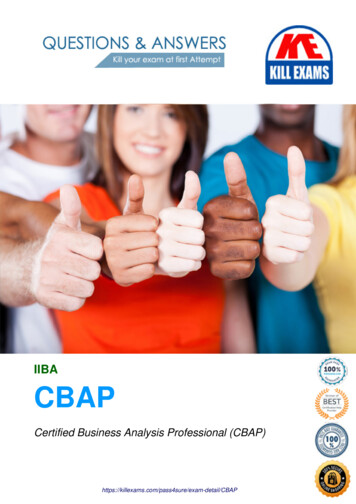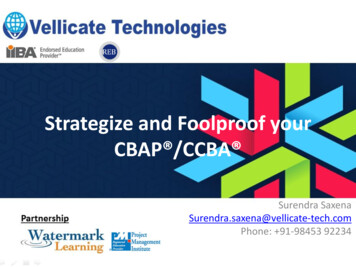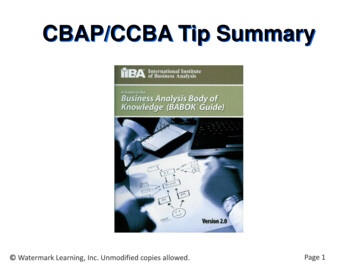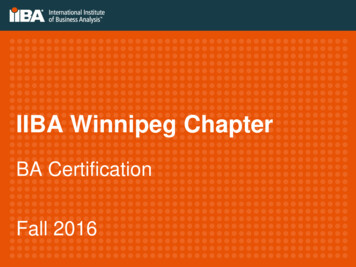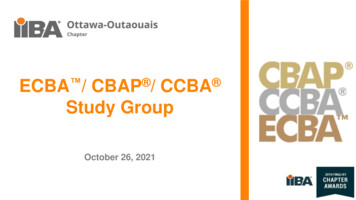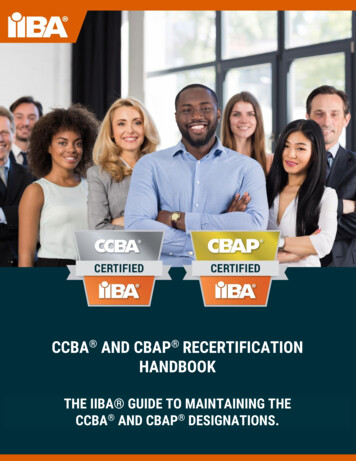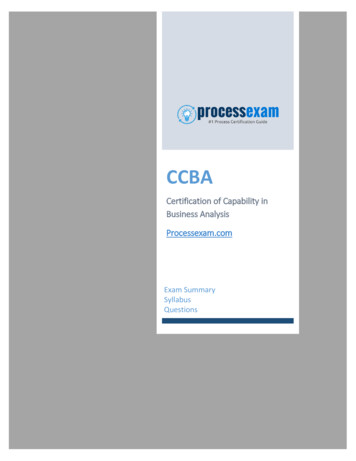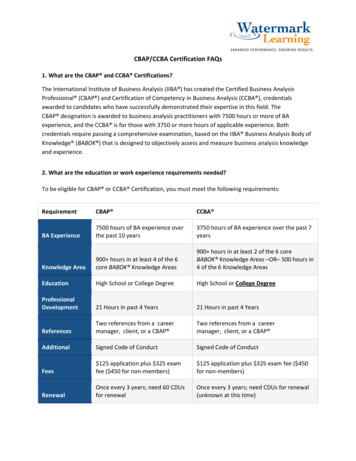
Transcription
CBAP/CCBA Certification FAQs1. What are the CBAP and CCBA Certifications?The International Institute of Business Analysis (IIBA ) has created the Certified Business AnalysisProfessional (CBAP ) and Certification of Competency in Business Analysis (CCBA ), credentialsawarded to candidates who have successfully demonstrated their expertise in this field. TheCBAP designation is awarded to business analysis practitioners with 7500 hours or more of BAexperience, and the CCBA is for those with 3750 or more hours of applicable experience. Bothcredentials require passing a comprehensive examination, based on the IIBA Business Analysis Body ofKnowledge (BABOK ) that is designed to objectively assess and measure business analysis knowledgeand experience.2. What are the education or work experience requirements needed?To be eligible for CBAP or CCBA Certification, you must meet the following requirements:RequirementCBAP CCBA BA Experience7500 hours of BA experience overthe past 10 years3750 hours of BA experience over the past 7yearsKnowledge Area900 hours in at least 4 of the 6core BABOK Knowledge Areas900 hours in at least 2 of the 6 coreBABOK Knowledge Areas –OR– 500 hours in4 of the 6 Knowledge AreasEducationHigh School or College DegreeHigh School or College DegreeProfessionalDevelopment21 Hours in past 4 Years21 Hours in past 4 YearsReferencesTwo references from a careermanager, client, or a CBAP Two references from a careermanager, client, or a CBAP AdditionalSigned Code of ConductSigned Code of ConductFees 125 application plus 325 examfee ( 450 for non-members) 125 application plus 325 exam fee ( 450for non-members)RenewalOnce every 3 years; need 60 CDUsfor renewalOnce every 3 years; need CDUs for renewal(unknown at this time)
3. How many questions are on the version 2.0 exam?Both the CBAP and CCBA exams have 150 multiple-choice questions.4. What is the difference between CCBA credentials and CBAP credentials?Besides the hours requirements noted above, the two exams emphasize different things. TheCBAP exam has many situation-based questions that require candidates to apply their knowledge ofthe BABOK . The CCBA exam is mostly comprised of knowledge and fact-oriented questions abouttasks and techniques in the BABOK . When the CCBA was introduced, we revised our CBAP OnlineStudy Exam question bank and created over 140 new situational questions to address this need.5. Can I use your CBAP study materials to study for the CCBA exam?Yes! According to the IIBA, the blueprint for the CCBA exam is very similar to that of the CertifiedBusiness Analysis Professional (CBAP ) exam. Specifically, the CCBA exam is different from theCBAP exam in that the CCBA exam presents mostly knowledge-based, factual questions drawing fromthe concepts presented in the BABOK Guide. Because our CBAP products and courses thoroughlycover the BABOK Guide, they are an excellent tool for preparing you for the CCBA exam.6. What are the 2.0 exams based on?The CBAP exam is based mostly on the tasks and techniques identified in the BABOK , version 2.0,which was released March 31, 2009. As noted separately, the questions contain some knowledge andfact questions, and many situational questions. The latter will test your ability to applythe BABOK information to real life. The current exam switched over to the 2.0 version on August 1,2009. While most information for the CBAP exam is contained in the BABOK , it is not the sole sourceof questions on the exam. The BABOK references other sources that CBAP candidates may findhelpful. The CCBA exam is based solely on the BABOK , with knowledge-based questions only. It wasintroduced January 1, 2011.7. How do I sign up for the exam and what does it cost?The exam is the final requirement for CBAP or CCBA certification and anyone desiring to take an exammust first apply for certification and pass the initial screening process. Once the IIBA determines yourqualifications to sit for an exam, you must schedule with the official testing agency to reserve a date fora computerized exam. You will receive an email with instructions once your reservation is approved.Visit www.IIBA.org for the complete process. Total cost (application plus exam) for IIBA members is 450 USDTotal cost (application plus exam) for non-members is 575 USD
Candidates can save money on the cost of the exam by applying for IIBA membership. The cost ofmembership is 125/year. NOTE: costs are subject to change without notice. Check withwww.IIBA.org for the current prices.8. Is it enough to read and study only the BABOK Guide, or should I be studying other sources ofknowledge about the topics in the BABOK Guide?The BABOK Guide should be your main resource and it will provide much of the reference material youneed. Watermark Learning's CBAP Certification Study Guide (2nd Edition) is another resource werecommend, and is highly focused on the exam. Mastering the Requirements Process (2nd Edition) bySuzanne and James Robertson, and Software Requirements, Second Edition, by Karl Wiegers may alsobe helpful.9. Where can we access a formal class to prepare for the exam? Are they offered by the IIBA ?Watermark Learning has formal CBAP Prep classes and CCBA Prep classes scheduled throughout theyear. We offer these classes in person and live online over the internet. The IIBA does not provide anyformal training.10. Are there practice exams readily available? How can I get them? Does the IIBA provide sampletests through the website?The IIBA does not provide sample tests. There are some online exams available, and make sure you findexams developed by people or companies such as Watermark Learning who are CBAP certified. Thatway you will be more likely to have realistic CBAP exam simulations. Our CBAP Online StudyExam and CCBA Online Study Exam are a great way to prepare, with three study modes including arealistic exam simulator. We have over 900 questions in our CBAP Online Study Exam and almost 800 inthe CCBA Online Study Exam available to give you experience with the types of questions you will see onthe 2.0 exam.11. What percentage is required to pass the CBAP or CCBA ?The IIBA has not published percentages yet. Our best guess for that is because the sample size ofexaminees is small enough so that they cannot yet assign an exact "cut score" for either exam. Assumeyou will need to score 70% or better to pass.12. What is the overall first time pass rate of those taking the CBAP ?The latest numbers we have heard put the pass rate at between 80% and 90%. Note that is not anofficial number, just our best guess. It is high partly because the IIBA screens applications so well and
demands so many years of experience. It is also high because examinees so far have been superprepared to pass.13. What is the best way to demonstrate that I meet the requirement of 7500 or 3750 hours?You need 750 or 3750 hours spent on business activities, and not just working hours. IIBA has onlineapplications to complete with project information. The form asks for information such as project name,start/end date, your role, project organization and contact, and project hours spent doing businessanalysis tasks as well as describing the tasks and your deliverables. The IIBA audits a certain number ofapplications, so the hours you list should be as accurate as possible. Visit our CBAP Resources page todownload a complimentary application worksheet to help you organize your hours.14. The online CBAP and CCBA application lists non-BA tasks for projects. Should I put down anynon-BA hours on my application?Here is the situation. If you indicate any non-BA tasks, the IIBA will deduct a proportionate percentageof hours from your reported project hours. Let us say you worked 1000 hours on a project, and indicated3 tasks, 2 of which were BA work and one was a PM task. The IIBA will then deduct 33% or 333 hoursfrom your 1000 hours, leaving you a net of only 667 hours to count towards your total. Take this intoaccount as you report hours and tasks on your application. Our advice: only report BA tasks and only BAhours to avoid having any hours deducted. See the IIBA's own FAQ document on www.IIBA.org for moredetailed information on this.15. Do I need experience in all of the Knowledge Areas to apply?No, the IIBA has established you need 900 hours in at least 4 of the 6 core Knowledge Areas (KAs) toapply for the CBAP . For the CCBA , you need 900 hours in 2 of the core KAs or 500 hours in 4 of the 6core KAs.16. How long does it take to get approved to take the exam once you complete the application?Within two weeks of receiving your application package IIBA will notify you that your application isbeing processed. The IIBA will then assess the application for completeness and fulfillment of theCBAP or CCBA certification requirements. The IIBA will notify you, via email, of the results of thisassessment within 21 days of receiving the application.17. Do you recommend any books to help prepare for the certification that would contain practicequestions for the exam?Watermark Learning's CBAP Certification Study Guide, Second Edition, currently used in ourCBAP Certification Preparation Course, contains over 200 sample questions. Our Guide also provides atrial subscription to our CBAP Online Study Exam, which contains 900 questions for further practice.
Be prepared to spend 80-100 hours to read, study, memorize, and take practice exams. Download acopy of our complimentary CBAP and CCBA Preparation Roadmap on our CBAP/CCBA Resourcespage.18. Are there any suggestions you have that a study group can follow for local chapters?We have heard it works best to divide up the BABOK section by section, and assign a section a week forthe group to read and review. Have one person lead each section and prepare an overview of thesection, and lead a discussion. Some groups practice by creating and taking exam questions and othersuse exam questions from our Guide or Online Study Exam for practice. If you participate in a book club,the process is similar, only you are reading to pass the CBAP or CCBA , not for fun!19. Where can I get the BABOK book to study for the exam?You can download it from the IIBA web site. Visit www.IIBA.org and go to the "ProfessionalDevelopment" section and look for the BABOK menu item. That release of the BABOK is the basis forthe current CBAP and CCBA exams.20. What counts towards the required 21 professional development hours?Any business analysis training topic, such as requirements elicitation, requirements analysis or modelingcourses, requirements planning/managing, etc. Training on related fields such as project managementor software testing does not count towards the 21 hours. Nearly every Watermark Learning BA courseapplies to the 21 hours. Contact us if you have any questions.21. Can we send the CBAP application without having the needed 21 hours, and once accepted wetake the course that gives us 21 hours?You must have the 21 hours of courses before you submit your application. You do not need to submit acourse certificate with your application, but be prepared to provide one if you are audited.22. What is a good time frame for study prior to taking the exam?An "ideal" span is around 3-6 months, depending on your approach. Plan on spending around 100 hourspreparing, which is the average range we found in our research. You can lessen this time with a class orour CBAP Online Study Exam or our CCBA Online Study Exam. If you plan on just using the BABOK orjoining a study group, plan on at least 6 months. That gives you plenty of time to study in a relaxedmanner and requires the least "overtime" to study. A person could also do it in 4-6 weeks, but then beprepared to study nights and weekends, or to take entire days off to read, study, memorize, and takepractice exams.
23. Do you feel a CBAP prep course will shorten the 3-6 month study time needed?Yes, we do. Taking a CBAP or CCBA prep class, especially in conjunction with using an online examsimulator, can reduce your study time to less than 100 hours and the duration to 3 months or less. Itdoes so because it will help you focus on the critical areas to study for the exam. It also helps youdevelop your own best method for preparing for the exam vs. wasting time to discover your ownmethod. Another benefit of a class is taking practice exams in a simulated test environment anddiscussing the rationale for the answers with your CBAP-certified instructor. There is also the addedbenefit of learning from the questions asked by other students.24. What is the value of certification?Here is an excellent article written by Michael Gladstone, IIBA Vice President Certification and CIO thatdiscusses the many benefits to becoming a CBAP . Please visit the IIBA site for additional informationon certification.About Watermark LearningWatermark Learning helps improve project success with focused business analysis, projectmanagement, and business process management training and mentoring. We foster results through ourunique blend of industry best practices, a practical approach, and an engaging delivery. We conveyretainable real-world skills to motivate and enhance staff performance, adding up to enduring results.Watermark Learning offers public, private, and online training. With our academic partner, AuburnUniversity, we also provide Masters Certificate Programs to help organizations be more productive, andassist individuals in their professional growth. Watermark is a PMI Global Registered EducationProvider, and an IIBA Endorsed Education Provider.CBAP and CCBA are registered certification marks owned by International Institute of Business Analysis. These certificationmarks are used with the express permission of International Institute of Business Analysis. Watermark Learning, Inc. All rights reserved worldwide. Unmodified copies allowed.
Yes! According to the IIBA, the blueprint for the CCBA exam is very similar to that of the Certified Business Analysis Professional (CBAP ) exam. Specifically, the CCBA exam is different from the CBAP exam in that the CCBA exam presents mostly knowledge-based, factual questions drawing from the concepts presented in the BABOK Guide. Becaus.
